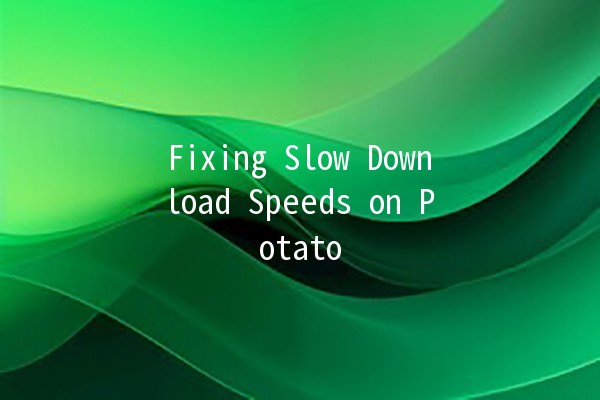Slow download speeds can be frustrating, especially when you're in a hurry or trying to get important files. If you've been dealing with sluggish performance, fear not! In this article, we will explore various strategies to address the slow download speeds on Potato, a popular platform for file downloads and sharing. Let's dive into five effective tips that can enhance your download experience.
Understanding Slow Download Speeds
Before jumping into the solutions, it's essential to understand why download speeds might be slow. Factors affecting download speeds include your internet connection, server location, file size, and network traffic. Identifying where the bottleneck lies can help target the right fix.
One of the most common reasons for slow download speeds is an unstable internet connection. Here are steps to diagnose your connection:

How to Check:
Speed Test: Use a tool like Speedtest.net to determine your current download and upload speeds. Compare this with what your internet service provider (ISP) advertises.
Router Check: Ensure your router is in a central location and not obstructed by walls or furniture.
Example of Application:
If tests reveal a significantly lower speed than expected, consider resetting your router. Unplug it for about 30 seconds, wait for it to restart, and retest your speeds.
Optimizing your computer's network settings can significantly improve download speeds. This involves adjustments to ensure your device communicates more efficiently with the network.
Steps for Optimization:
Adjust DNS Settings: Switching to a faster DNS server, like Google (8.8.8.8) or Cloudflare (1.1.1.1), can enhance loading times and overall speeds.
Disable VPNs: If you are using a VPN to access the Potato platform, try disabling it temporarily to see if speeds improve. VPNs can sometimes slow down your connection due to encryption processes.
Example of Application:
You can easily change your DNS settings in your computer's network settings. Restart your device after making changes to ensure they take effect.
Often, network congestion during peak hours can lead to slower download speeds. If possible, timing your downloads when fewer users are online can lead to faster results.
Why This Matters:
Internet speeds can fluctuate based on the number of users online at any given time. During peak hours (like evenings), many users could be accessing the same bandwidth, causing slowdowns.
Example of Application:
If you notice slower speeds during busy times, try scheduling large downloads for early mornings or late nights, when there's less network traffic.
Outdated software can sometimes be a hidden culprit in slow download speeds. This includes your operating system, browsers, and even the Potato application itself.
Why Updates are Important:
Software updates often include performance improvements, bug fixes, and security updates that can all impact speed.
Example of Application:
Regularly check for updates on your operating system and browsers. For Windows, you can visit Settings → Update & Security. Ensure that the Potato application is also updated to the latest version.
Browsers can retain a lot of cached data and extensions that create bloat, ultimately affecting performance. Clearing your cache and managing your extensions can remedy this problem.
How to Clear Your Cache:
For Chrome: Go to Settings > Privacy and security > Clear browsing data > Cached images and files.
Managing Extensions: Disable extensions that you don't use frequently, as they can slow down your browser.
Example of Application:
Clearing cache can often speed up loading times and free up space. Aim to clear your cache weekly or monthly to maintain optimal performance.
Common Questions
Why are my downloads consistently slow?
Several factors can contribute to persistent slow downloads, including your internet connection quality, network congestion, server location, and even the device you're using. Running speed tests can help identify if the issue is with your local network or the server hosting your downloads.
Can my hardware affect download speeds?
Absolutely! Older hardware, particularly slow hard drives or outdated network cards, can hinder download speeds. Upgrading to faster hardware can significantly enhance performance in downloading large files.
Does background activity affect download speeds?
Yes, background applications consuming bandwidth can significantly impact download speeds. Make sure to close unnecessary applications while downloading to maximize your connection's efficiency.
What should I do if changing DNS does not help?
If switching DNS providers does not improve speeds, consider checking your router configuration or contacting your ISP. They can help identify if there are issues at their end that need addressing.
How can I improve my wireless signal for downloads?
Improving your wireless signal can be done by repositioning the router, reducing interference from other devices, and using WiFi extenders or mesh networks to ensure a stronger signal throughout your home.
Why does my download speed vary based on file size?
Larger files often take longer to download due to the increased amount of data being transmitted. However, if a smaller file is also slow to download, it could indicate network issues or server congestion.
By following these tips and addressing each aspect that contributes to slow download speeds, you can enjoy a more efficient and quicker downloading experience on Potato. Happy downloading!